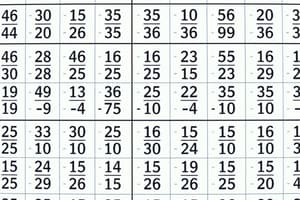Podcast
Questions and Answers
How can the multiplication table help us understand calculations?
How can the multiplication table help us understand calculations?
By providing a visual representation of multiples and values.
What does each row in the multiplication table represent?
What does each row in the multiplication table represent?
The corresponding multiple of the top number.
How can one calculate any value in the multiplication table?
How can one calculate any value in the multiplication table?
By multiplying the number on the left by the number above it.
What pattern can be observed when multiplying numbers to simplify calculations?
What pattern can be observed when multiplying numbers to simplify calculations?
What is the result of 3 x 7 using the simplification pattern?
What is the result of 3 x 7 using the simplification pattern?
How can the multiplication table be used to avoid memorizing individual entries?
How can the multiplication table be used to avoid memorizing individual entries?
Explain how commutativity can be applied in multiplication.
Explain how commutativity can be applied in multiplication.
If you want to find 7 times 8, how can commutativity be used?
If you want to find 7 times 8, how can commutativity be used?
Explain the concept of associativity in multiplication.
Explain the concept of associativity in multiplication.
How can associativity be applied to find 12 times 35?
How can associativity be applied to find 12 times 35?
What is the result of 12 times 35 using associativity and the distributive property?
What is the result of 12 times 35 using associativity and the distributive property?
How does understanding multiplication rules benefit daily life and education?
How does understanding multiplication rules benefit daily life and education?
Study Notes
Exploring the Multiplication Table Up to 20 x 10
The multiplication table is a foundational tool that helps us understand, memorize, and perform calculations using the rules of multiplication. In this discussion, we'll dive into the specifics of the multiplication table extending from one through twenty times ten (up to (20 \times 10)).
Memorizing the Multiples
Each row within our multiplication table represents the corresponding multiple of the top number. For instance:
[ \begin{array}{|c|cccccc|} \cline{2-7} & 1 & 2 & 3 & 4 & ... & 10 \ \hline 1 & 1 & 2 & 3 & 4 & ... & 10 \ 2 & 2 & 4 & 6 & 8 & ... & 20 \ 3 & 3 & 6 & 9 & 12 & ... & 30 \ ... & ... & ... & ... & ... & ... & ... \ 10 & 10 & 20 & 30 & 40 & ... & 100 \ \end{array} ]
Knowing how to find these values will help you avoid having to memorize each entry individually.
Deriving Values Using Rules of Multiplication
If you don't yet have the whole table committed to memory, here's how to calculate any given value in the table:
-
Multiply the number on the left by the number above it.
- For example, to get the first element in the second column ((2 \times 2 = 4)), multiply 2 by itself.
-
Look for patterns in the results, which can make calculating larger numbers easier:
- If the product ends with zeroes, remove them and double the remaining digits. This pattern holds true until tens place gets involved.
- From the table: (3 \times 7 = 21,) removing zeros leaves 2, doubling gives 4; therefore, (3 \times 8 = 24.)
- If the product ends with zeroes, remove them and double the remaining digits. This pattern holds true until tens place gets involved.
-
Apply related addition facts like commutativity and associativity when needed:
-
Commutativity allows swapping the order of factors without changing their product.
- For example, if you want to find (7 \times 8,) recall that (7 \times 8 = 8 \times 7;) so, just look for (8 \times 7) in your mental or physical table.
-
Associativity means that the grouping of operands does not affect their result.
- Let’s say you need to find (12 \times 35.) Break down the large factor into smaller ones, applying the distributive property twice. [ 12 \times 35 = 12 \times (30 + 5) = (12 \times 30) + (12 \times 5) = 360 + 60 = 420 ]
-
Practical Usage Scenarios
After learning this material, its utility becomes apparent across various disciplines, including everyday math, budgeting, cooking, and science fields such as physics and chemistry.
In summary, familiarity with the multiplication table up to (20 \times 10) opens doors to numerous mathematical concepts and practical applications. Knowledge acquired through understanding rules of multiplication, discovering hidden patterns among products, and utilizing straightforward calculation techniques offers significant benefits in daily life, education, and career paths alike.
Studying That Suits You
Use AI to generate personalized quizzes and flashcards to suit your learning preferences.
Description
Dive into the specifics of the multiplication table extending from one through twenty times ten (up to 20 x 10). Learn how to derive values, memorize multiples, and apply rules of multiplication efficiently for practical usage in various disciplines.



